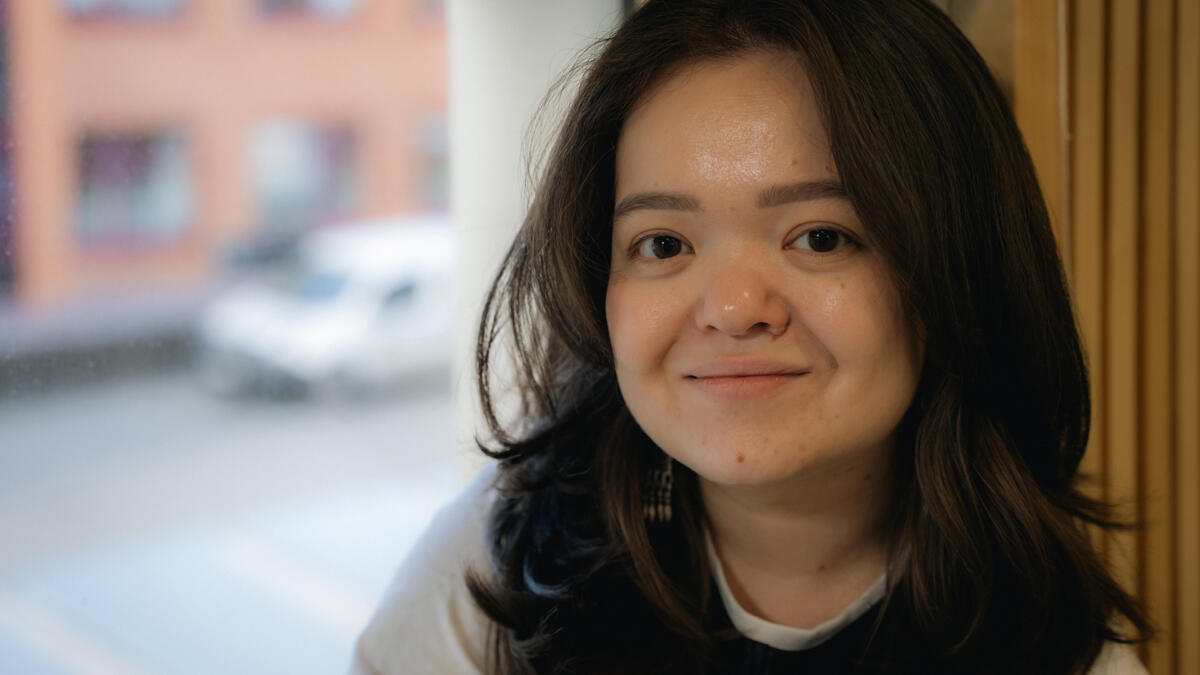Doctoral researcher Aizhan Sultan: A journey through music, identity and inclusion
Making her way from the steppes of Kazakhstan to the stages of Helsinki, doctoral researcher Aizhan Sultan’s story is one of resilience, transformation and artistic liberation.

Born in Kazakhstan and raised under the shadow of Soviet ideology, Aizhan is now a doctoral researcher at the Sibelius Academy. She is not only redefining what it means to be both a musician and a researcher but also contributing to the reshaping of accessibility and inclusion within the arts.
Aizhan’s music journey began in nursery school, where she was inspired by a charismatic music teacher. Despite not growing up in a professional musical environment, her passion for music was undeniable. From piano lessons in Kazakhstan to vocal competitions and pop/jazz studies, her early years were filled with exploration and performance.
“I always knew I would be an artist,” she recalls.
A European odyssey into academia
An appearance on Ukraine’s X Factor brought Aizhan significant national fame, but also emotional challenges. “I was very young then, and looking back now, I didn’t have the tools to handle it,” she admits. The experience, though validating, also exposed her to the pressures of public life. “People were stopping me on the street asking for photos. It was overwhelming,” she says.
Following this, she longed to move to Europe to further her classical training. Her academic path led her from Kazakhstan to Italy and then to Lithuania, where she completed her master’s degree in classical singing. But it was a spontaneous visit to Helsinki that changed everything.
“It was raining, dark, November – and somehow I just knew this was where I needed to be,” she says.
That instinct led her to the Sibelius Academy, where, after many twists and turns, she began her doctoral studies.
“I had just one month to write my application – people usually prepare for a year. But I decided to try.’”
She was first accepted into a preparatory year, after which she was admitted as a doctoral researcher in 2024. That preparatory period allowed her to refine her proposal, build a support network and gain confidence in navigating the academic system. Her advice to aspiring doctoral students is clear:
“Be true to yourself. Don’t follow trends – just follow your instincts. And don’t be afraid of criticism. It’s part of the process.”
Decolonising the self through art
Aizhan’s artistic doctoral research, titled Breaking Silence in the Steppes: Decolonising Artistic Identity and Its Consequences, is a powerful exploration of postcolonial identity and ableism. When complete, it will consist of two doctoral concerts, two articles and a recorded album. The work combines autobiography, artistic performance and critical reflection in an effort to challenge inherited narratives and reclaim cultural roots.
“I didn’t even realise we were colonised until I left Kazakhstan. I grew up speaking Russian, not Kazakh. I had internalised so many biases, and through this research, I’m also trying to decolonise myself.”
Living with achondroplasia herself, Aizhan also addresses ableism in classical music and society through her personal lens. “Only in Finland have I been fully able to discuss and confront my disabilities as an artist. But there are other stereotypes I want to challenge, too – for example, what a female opera singer is expected to look like. I’ve faced these biases, and now I want to dismantle them.”
Improvisation and rediscovery
Although now a multitalented, versatile artist working across opera, musical theatre and cross-cultural folk music, Aizhan admits that improvisation has been one of her biggest challenges – a skill once central to Kazakh folk music but lost through colonisation.
“Within the classical tradition, I was taught not to move on stage, not to improvise. But Kazakh folk music is rooted in improvisation. Through my research, I’m trying to reconnect with that.”
Her upcoming two doctoral concerts aim to revive these practices, blending traditional instruments like the dombra with contemporary performance.
“We are here, and we need your attention”
For Aizhan, art is not merely a form of expression – it is activism. “Art can change minds, inspire people and reveal truths that words alone cannot.”
Through her work, she is not only reclaiming her own voice but also creating space for others to be heard. She thoroughly believes in the transformative power of art. “If it’s not us speaking through our art, then who will? We have the power – but also the responsibility – to inspire, to challenge, to change things.”
Aizhan’s advocacy for accessibility and inclusion extends beyond her research. After encountering inaccessibility even within the university, she voiced her concerns. With the support of her supervisor Nathan Thomson, the course All Abilities Band was established. The pioneering course is offered by Uniarts Helsinki’s Open Campus, and it is aimed at making music education more inclusive for disabled artists.
As one of the teachers of the course, Aizhan looks forward to drawing inspiration and material from her doctoral project for the course, but she also hopes that the course will have a broader impact.
“This may be one way for us to show that we are here, we need your attention, and we deserve to be part of this space,” she says.
Aizhan Sultanova’s doctoral project is supported by the Kone foundation. Read more about Aizhan on her homepage.
Next application period to the doctoral studies at the Sibelius Academy is between 7 –21 January 2026.